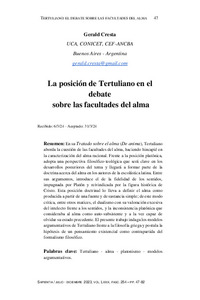Please use this identifier to cite or link to this item:
https://repositorio.uca.edu.ar/handle/123456789/19823| DC Field | Value | Language |
|---|---|---|
| dc.contributor.author | Cresta, Gerald | es |
| dc.date.accessioned | 2025-05-23T17:26:42Z | - |
| dc.date.available | 2025-05-23T17:26:42Z | - |
| dc.date.issued | 2023 | - |
| dc.identifier.issn | 0036-4703 | - |
| dc.identifier.uri | https://repositorio.uca.edu.ar/handle/123456789/19823 | - |
| dc.description.abstract | En su Tratado sobre el alma (De anima), Tertuliano aborda la cuestión de las facultades del alma, haciendo hincapié en la caracterización del alma racional. Frente a la posición platónica, adopta una perspectiva filosófico-teológica que será clave en los desarrollos posteriores del tema y llegará a formar parte de la doctrina acerca del alma en los autores de la escolástica latina. Entre sus argumentos, introduce el de la fidelidad de los sentidos, impugnada por Platón y reivindicada por la figura histórica de Cristo. Esta posición doctrinal lo lleva a definir el alma como producida a partir de una fuente y de sustancia simple; de este modo critica, entre otros matices, el dualismo con su valoración excesiva del intelecto frente a los sentidos, y la inconsistencia platónica que consideraba al alma como auto-subsistente y a la vez capaz de olvidar su estado precedente. El presente trabajo indaga los modelos argumentativos de Tertuliano frente a la filosofía griega y postula la hipótesis de un pensamiento existencial como contrapartida del formalismo filosófico. | es |
| dc.description.abstract | In his Treatise on the Soul (De anima), Tertullian addresses the question of the faculties of the soul, emphasizing the characterization of the rational soul. In contrast to the Platonic position, he adopts a philosophical-theological perspective that will be crucial in later developments of the subject and will become part of the doctrine regarding the soul in the authors of Latin scholasticism. Among his arguments, he introduces the fidelity of the senses, challenged by Plato and vindicated by the historical figure of Christ. This doctrinal position leads him to define the soul as produced from a source and of simple substance; thus, he criticizes, among other nuances, the dualism with its excessive valuation of the intellect over the senses, and the Platonic inconsistency that considered the soul as self-subsistent and at the same time capable of forgetting its previous state. The present work explores Tertullian's argumentative models against Greek philosophy and posits the hypothesis of an existential thought as a counterpart to philosophical formalism. | es |
| dc.format | application/pdf | es |
| dc.language.iso | spa | es |
| dc.publisher | Pontificia Universidad Católica Argentina. Facultad Filosofía y Letras | es |
| dc.rights | Atribución-NoComercial-CompartirIgual 4.0 Internacional | * |
| dc.rights.uri | http://creativecommons.org/licenses/by-nc-sa/4.0/ | * |
| dc.source | Sapientia. 2023, 79(254) | es |
| dc.subject | TERTULIANO | es |
| dc.subject | ALMA | es |
| dc.subject | PLATONISMO | es |
| dc.subject | MODELOS ARGUMENTATIVOS | es |
| dc.title | La posición de Tertuliano en el debate sobre las facultades del alma | es |
| dc.title | Tertullian's stance in the debate on the faculties of the soul | es |
| dc.type | Artículo | es |
| uca.issnrd | 1 | es |
| uca.affiliation | Fil: Cresta, Geral. Pontificia Universidad Católica Argentina; Argentina | es |
| uca.affiliation | Fil: Cresta, Gerald. Consejo Nacional de Investigaciones Científicas y Técnicas; Argentina | es |
| uca.affiliation | Fil: Creta, Gerald. Academia Nacional de Ciencias de Buenos Aires, Centro de Estudios Filosóficos; Argentina | es |
| uca.version | publishedVersion | es |
| item.fulltext | With Fulltext | - |
| item.languageiso639-1 | es | - |
| item.grantfulltext | open | - |
| Appears in Collections: | SAP - 2023 Vol LXXIX nro. 254 | |
Files in This Item:
| File | Description | Size | Format | |
|---|---|---|---|---|
| posicion-tertuliano.pdf | 473,93 kB | Adobe PDF |  View/Open |
This item is licensed under a Creative Commons License

